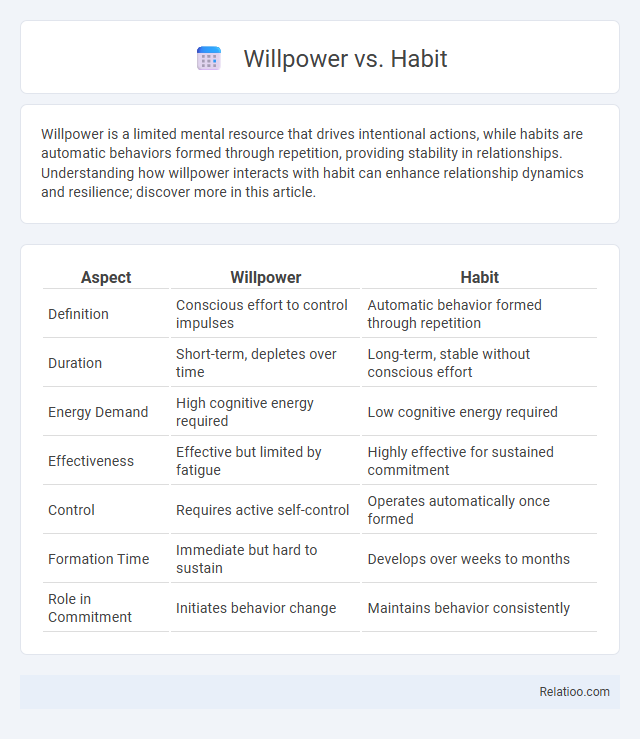Willpower is a limited mental resource that drives intentional actions, while habits are automatic behaviors formed through repetition, providing stability in relationships. Understanding how willpower interacts with habit can enhance relationship dynamics and resilience; discover more in this article.
Table of Comparison
| Aspect | Willpower | Habit |
|---|---|---|
| Definition | Conscious effort to control impulses | Automatic behavior formed through repetition |
| Duration | Short-term, depletes over time | Long-term, stable without conscious effort |
| Energy Demand | High cognitive energy required | Low cognitive energy required |
| Effectiveness | Effective but limited by fatigue | Highly effective for sustained commitment |
| Control | Requires active self-control | Operates automatically once formed |
| Formation Time | Immediate but hard to sustain | Develops over weeks to months |
| Role in Commitment | Initiates behavior change | Maintains behavior consistently |
Understanding Willpower vs Habit
Willpower is the conscious effort required to resist short-term temptations in order to meet long-term goals, while habits are automatic behaviors formed through repeated actions that do not require conscious thought. Your ability to leverage habits reduces reliance on willpower by embedding positive routines that support self-improvement naturally. Developing strong habits enhances your capacity for lasting change, as it minimizes decision fatigue and conserves willpower for more complex challenges.
The Science Behind Willpower
The science behind willpower reveals that it functions like a limited resource, depleting with overuse and replenishing with rest, which influences your ability to resist temptations and maintain focus. Habits, on the other hand, automate behaviors through neural pathways, reducing the need for continuous self-control and conserving willpower for more demanding tasks. Understanding this dynamic enables effective self-improvement strategies by combining deliberate willpower with the formation of positive habits, optimizing your long-term behavioral change.
The Psychology of Habit Formation
The psychology of habit formation reveals that repetitive behaviors trigger neural pathways strengthening automatic responses, reducing the cognitive load required for self-control. Willpower operates as a finite resource, often depleted during decision-making processes, making reliance solely on it less sustainable than cultivating positive habits. Effective self-improvement strategies leverage habit formation by embedding desired actions into daily routines, enhancing long-term behavior change and minimizing reliance on conscious effort.
Key Differences Between Willpower and Habit
Willpower relies on conscious effort and mental energy to control impulses, while habits operate automatically through repeated behavior patterns ingrained in the brain. Your ability to develop lasting self-improvement hinges more on building positive habits than on relying solely on willpower, which can easily be depleted. Understanding these key differences can help you create sustainable changes without exhausting your mental resources.
Why Willpower Alone Isn’t Enough
Willpower alone isn't enough because it is a limited resource that depletes with use, making reliance on it unsustainable for long-term change. Habits, formed through consistent behavior and automatic responses, provide a more reliable framework for self-improvement by reducing mental effort and increasing consistency. Effective self-improvement focuses on building strong habits and creating environments that support desired behaviors, rather than relying solely on fluctuating willpower.
The Power of Automatic Habits
The power of automatic habits lies in their ability to streamline your behavior, reducing the need for constant willpower and making self-improvement more sustainable. Habits form neurological pathways that trigger actions with minimal conscious effort, freeing mental energy for other goals. Focusing on building positive automatic habits transforms your daily routine and accelerates personal growth effectively.
Building Lasting Habits for Success
Building lasting habits requires consistent practice and deliberate actions that shape your daily routines over time. Willpower alone often falters under stress, making habit formation crucial for sustainable self-improvement and long-term success. Focusing on small, repeatable behaviors helps embed positive changes into your lifestyle, creating a foundation that supports continuous growth and achievement.
How Willpower and Habits Work Together
Willpower and habits create a powerful synergy for lasting self-improvement by complementing each other's strengths. Willpower acts as the initial driver to establish new routines, while habits automate behaviors, reducing the need for continuous effort. You can leverage willpower strategically during challenging moments to reinforce habits that sustain positive change over time.
Tips to Strengthen Willpower and Build Habits
Strengthen willpower by setting clear, achievable goals and practicing delayed gratification through mindfulness exercises that enhance self-control. Build habits effectively by using cues and routines, starting small to ensure consistency, and tracking progress to maintain motivation. Focusing on self-improvement requires aligning daily actions with long-term objectives, leveraging habit stacking to integrate new behaviors seamlessly into existing routines.
Choosing the Best Path: Willpower or Habit?
Choosing between willpower and habit for self-improvement hinges on sustainability and mental energy management. Willpower demands constant conscious effort, often leading to burnout, while habit formation leverages automatic behaviors, embedding change into daily routines with less cognitive strain. Research from behavioral psychology indicates that building strong habits creates a more reliable foundation for long-term personal development compared to relying solely on willpower.

Infographic: Willpower vs Habit
 relatioo.com
relatioo.com